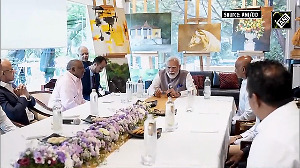Through Manorathangal, M T Vasudevan Nair makes himself available to a whole new generation of uninitiated viewers, who can familiarise themselves with his rich body of work and hope to learn a thing or two about life in all its messy grandeur and flawed imperfections, notes Arjun Menon.

M T Vasudevan Nair has been wrestling with the evils underlying the Malayalee identity for most of his career, building up and breaking down the quintessential romanticism and aloofness associated with a particular subset of Kerala society.
The anthology series Manorathangal (Mindscapes), celebrating the legacy of the literary giant, is a tribute to his prolific body of work dedicated to the complex human behavior and ever-changing Malayalee psyche plagued by urbanisation.
The nine feature films are based on short stories written by Nair, who has also penned the screenplays.
'Naatinpuram Nanmakalal Samvrudham', which roughly translates to 'Villages embody the spirit of kindness galore' -- a phrase penned by poet Kuttipuram Keshavan Nair -- has come to define a particular kind of obsessive affection and nostalgia attached to the rural way of life in Kerala.
But this catchy adage does not hold much weight in Nair's oeuvre. The writer has based his career on rebuking the fairy tale look at life in a village through his seething portrayals of the inadequacies and debauchery, hidden underneath the seemingly well-meaning conservatism of the people boxed in rural societies.
This project is a fascinating breakdown of this concept through nine unique stories examining the core frailties and psychological conflicts underlying the human experience.

Priyadarshan's Shilalikhitham (Inscriptions), the first film in the anthology, like all other entries in the series, is presented by Kamal Haasan.
The film takes us into the life of an archeology professor P K G Nair (Biju Menon), who has been tasked with his wife Sarala (Shivada) to seek the approval of his aging mother back in his village, to sell off their ancestral home and land to fund their ongoing house construction in the city.
The plot is pretty basic for any reader of Nair's usual protagonists who are forced to return to their ancestral homes for a reckoning with their past.
But Shilalikhitham is not an easy, breezy throwback by any means and is a painfully critical portrait of a society blinded by a sense of feudal entitlement.
PKG finds himself in a moral dilemma when he finds out that his former lover has been found poisoned lying in a stream, with no one caring enough to even check if she is alive.
Biju Menon is cleverly cast in the lead role as the actor's innate charm and humanity directly contrasts with the stoic, almost unrelenting, cruelty exhibited by the character in the course of the film, and that constant friction makes things ambiguous.
Shilalikhitham untangles a complex truth about the futility of generalised notions of good and bad, suited to human convenience.

Swargam Turakkuna Samayam (When the Doors of Heaven Open) deals with death as its central motif to examine the gradual falling apart of a family.
Bedridden father Madhavan Mash (Nedumudi Venu) stands in the way of his self-centered children's busy lives.
Kuttinarayanan (Indrans) is a purveyor of death in a village, a simpleton who is called upon to escort aged people to a peaceful demise.
Director Jayaraj is heavy-handed in his approach to the story and Ramesh Narayanan's overbearing score aligns with the film's melodramatic tone.
The anticipation surrounding death and the unreal aloofness of the family is drawn out ever so delicately by the use of repetitions and monotonous, insensitive conversations circling the bedridden father like vultures around its prey, waiting for the inevitable.
Death is inconvenient, but nothing is more inconvenient than the never-ending wait for it.

Shyamaprasad's Kazcha (Vision) follows the life of Sudha (Parvathy Thiruvothu), a middle-aged bank employee torn between a life of conformity and individuality, within the confines of a loveless marriage.
Juxtaposed with the bleakness and awry mood of the first two films in the anthology, this one is more hopeful in its storytelling and has M T examining the themes of toxic relationships and patriarchal conditioning through the lens of a woman's psyche.
The film opens with a strange phone call from Sudha to her alcoholic husband Prabhakaran (Narain) and we sense the uneasiness of their relationship right from the onset.
The screenplay echoes this once again at the very end, with another phone call with another man in another context.
By then, Sudha has finally realised her place in the world and it works due to Parvathy's empathetic performance.
Sudha's concealed taste in music and other passions find an outlet in an artist, who opens her up to a new way of looking at life. After all, in the words of Virginia Woolf herself, the only thing a woman truly needs is a 'room of one's own' and nothing more.

Santosh Sivan's Abhayam Thedi Veendum (Once Again, In Search of Refuge) features Siddique as a nameless wanderer, who happens to move into an isolated home in a wasteland-like village. The ecological horror novella-like structure of the short never makes it directly approachable like the other films in the entry.
Sivan uses abstract musings and associative imagery in its visual design, charting the descent into madness of a vagabond-like figure, who equates his lack of permanency as a means to tackle his painful past.
We get ghostly apparitions of a young woman haunting the protagonist and other symbolic gestures in this otherworldly tale about a man who loved nature as a balm to his bruised soul.

The assured film-making debut of Ashwathy Nair, M T Vasudevan Nair's daughter , is the fifth short film, Vilpana (The Sale), a profoundly sad story of a woman, haunted by loneliness and a feeling of worthlessness in her middle age.
Vilpana starts with a random furniture advertisement in a newspaper, connecting a recently divorced journalist Sunil Das (Asif Ali) with Githa Parekh (Madhoo), the lonely wife of an industrialist living in the heart of old Madras.
The film is structured around various prospective customers breaking off the brief weird conversations between Githa and Sunil at regular intervals, till they are interrupted by one final guest.
We get a glimpse of the loneliness hovering above the woman, forced to live an empty life, distant from her inattentive husband and estranged daughter.
The poignancy of the film's lead pair's on-screen chemistry is undercut drastically by the painfully inert and baffling dubbing work by Bagyalakshmi, who voices Madhoo in the film. The subtextual weight of the conversations is lost in misjudged dubbing choices that call too much attention to the literal nature of the dialogues.
Many wonderfully staged sequences and stories may be better served in literature than in the film medium, owing to their literalness, and this one lands somewhere in the middle.

Kadalkkaatu (Sea Breeze) again stands out for its literal quality.
The film continues the running theme of adultery and sneaky relationships in MT's most popular fiction but this time, foregrounds it in a more meaningful way.
Keshav (Indrajith Sukumaran) is caught between two women in his life: His pregnant wife Bharathi (Aparna Balamurali) and his more hip lady partner Margaret (Ann Augustine).
Kadalkkaatu heavily leans into the artifice of dialogues, written in a different context for a different medium.
The words coming out of the characters feel like cursory line readings and the wonderfully exuberant performance from Indrajith is marred by Director Rathish Ambati's loyalty to the original text.
Some of the supporting performances feel wooden.
But the film is not straightforward in its approach to such a common storyline and introduces some genuine tension and strange dissonance through clever character beats and story devices sprinkled throughout.

Mahesh Narayanan joins hands with Fahadh Faasil for Sherlock.
Their film is the most morose, contemplative of the stories that rely on procedural-like repetitions of actions to capture a moment in the life of a turbulent young man and his biggest foe: A cat named Sherlock.
Balakrishnan (Fahadh Faasil) is a jobless man who is brought on to Alberta, Canada, by his elder sister (played wonderfully by Nadia Moidhu) in hope of getting him into a worthwhile job.
Fahadh is perfectly cast as the passive yet cipher-like figure with a shoddy past and alcohol problems.
A deviation involving his sister's disastrous marriage and racist street brawls is sprinkled into the main narrative alongside his interaction with the nosy cat Sherlock, which follows him around, much to his chagrin. His gradual descent into a manic state of numbness is also shown.
But the film feels like an abstract and impenetrable character study but works for the moody atmosphere it conjures.

Ranjith's Kadugannawa Oru Yathra Kurippu (Kadugannawa: A Travel Note), starring Mammootty, is the most personal of the nine stories, with some elements of the author's own experiences during a trip to Sri Lanka.
It is the story of a senior journalist Venu Gopal (Mammotty), who on a professional visit to Sri Lanka, decides to look for his long-lost illegitimate step sister, who, he believes to be living a hard life after his family disowned her years ago.
Kadugannawa Oru Yathra Kurippu looks at an emotional moment in the life of a man trying to grapple with the guilt of living a better life when the person who meant a great deal to him for a brief stint in his life is struggling in a godforsaken wasteland.
Mammootty's internalised sensitivity and pathos add to this heartbreaking journey, albeit it lacks any stylistic flourishes.

The final film is a reworking of the classic P N Menon directed Olavum Theeravum (1970), also penned by M T Vasudevan Nair, based on his short story.
Mohanlal reprises the role of the timber trader Baputty in the new version of Olavum Theeravum (Ripples and the River Bank) alongside Nabeesa (Durga Krishna). Death unites two unlikely souls in this story of broken dreams and freewheeling romanticism.
Mohanlal steers the narrative with his effortless charm as the doomed lover.
The film, shot in beautiful black and white by Santhosh Sivan, boasts some of the more carefully considered images to have come out from a Priyadarshan film.
The director makes judicious use of the layered compositions, utilising each corner of the screen to direct our attention, reminiscent of his earlier works.
Through the umpteen men and women characters caught in the crossfire of the emotional catastrophe spread across this anthology, M T Vasudevan Nair makes himself available to a whole new generation of uninitiated viewers, who can familiarise themselves with his rich body of work and hope to learn a thing or two about life in all its messy grandeur and flawed imperfections.
Manorathangal streams on ZEE5.













 © 2025
© 2025